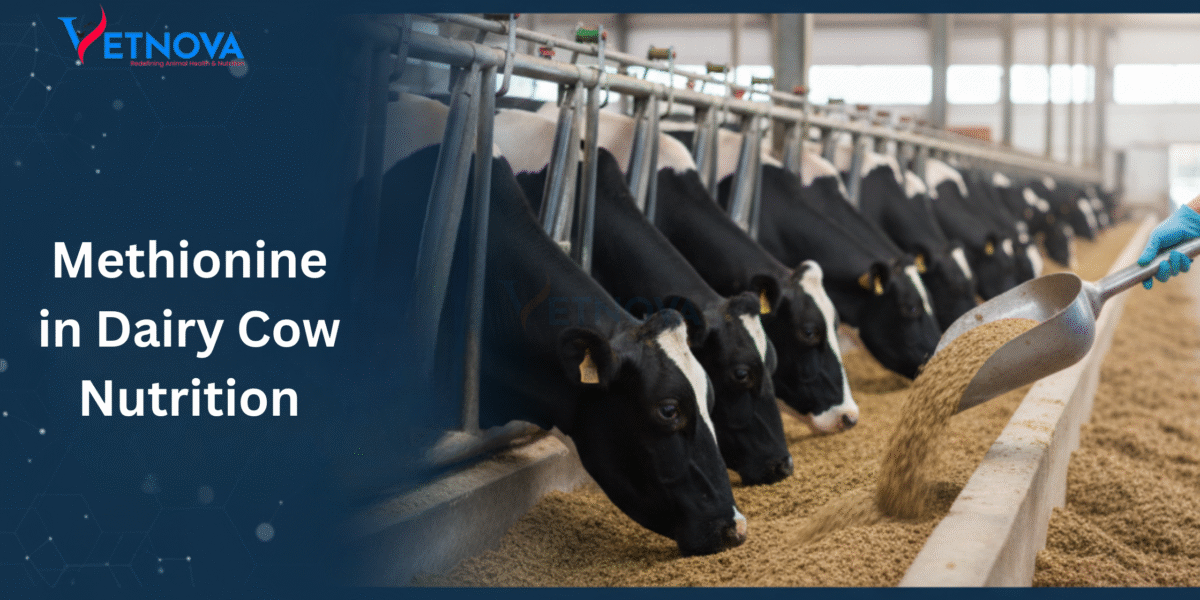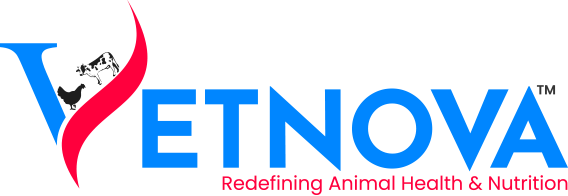Methionine in Dairy Cow Nutrition: The Foundation of Milk Yield and Herd Health
Balancing amino acids is one of the most crucial steps in dairy cow nutrition, and among them, methionine stands out as a cornerstone nutrient. It influences milk yield, reproductive performance, liver function, and immune strength, making it indispensable for dairy herds striving for high productivity and longevity.
What Is Methionine and Why Does It Matter in Dairy Cows?
Methionine is an essential sulfur-containing amino acid.
It supports:
- Protein synthesis and tissue development.
- Fat metabolism and liver protection.
- Antioxidant defence and immune resilience.
Because methionine is often the first-limiting amino acid in dairy rations, its deficiency can limit milk yield even when energy and protein levels seem sufficient.

How Methionine Works in the Cow’s Body
Once ingested, methionine serves two leading roles:
- Protein formation — directly used to build milk protein and tissue.
- Methyl group donor — via S-adenosylmethionine (SAM), methionine regulates DNA methylation, liver lipid metabolism, and antioxidant pathways.
However, rumen microbes degrade most methionine before it reaches the intestine. That’s why Rumen-Protected Methionine (RPM) is crucial. It ensures that the amino acid bypasses the rumen and is absorbed efficiently.
Key Benefits of Methionine in Dairy Nutrition
| Function | Impact on Dairy Cows |
| Milk synthesis | Increases milk protein and fat content |
| Liver health | Prevents fatty liver, reduces ketosis risk |
| Reproduction | Improves ovarian function and fertility |
| Immunity | Enhances resistance to mastitis and infections |
| Antioxidant defense | Promotes glutathione and taurine synthesis |
Methionine Requirements and Ideal Ratios
The Lysine: Methionine ratio in the metabolizable protein fraction should ideally be 3:1.
Here’s a quick reference guide for inclusion:
| Cow Stage | Methionine (% of MP) | Recommended Source |
| Early Lactation | 2.4% | Rumen-Protected Methionine |
| Mid Lactation | 2.2% | Feed-based + RPM |
| Late Lactation | 2.0% | Feed-based Methionine |
Maintaining the correct ratio ensures efficient feed utilisation, higher milk solids, and reduced nitrogen losses, aligning with sustainable dairy nutrition principles.
Methionine Deficiency: The Hidden Performance Blocker
A silent methionine gap can reduce performance even in well-fed herds. Signs include:
- Drop in milk yield or fat percentage
- Fatty liver or ketosis
- Delayed conception
- Increased somatic cell count (SCC)
- Dull coat, low immunity
If your herd shows these symptoms, evaluating amino acid balance and supplementing Vetnova’s Rumen-Protected Methionine can restore metabolic health and productivity.
Methionine in Transition Cow Management
The transition period (−21 to +21 days around calving) is when methionine plays its most critical role:
- Prevents fat accumulation in the liver
- Boosts dry matter intake post-calving
- Reduces oxidative stress and ketosis risk
- Supports immune response in fresh cows
Studies confirm that transition diets fortified with methionine result in higher peak milk yield and better post-calving recovery.
Sustainable Nutrition for Modern Dairy Farming
Incorporating methionine allows farmers to lower crude protein in feed while maintaining milk output. This enhances nitrogen efficiency and reduces the environmental footprint — an essential goal for today’s sustainable dairy operations.
- Benefits Summary:
- Higher milk yield and SNF
- Improved reproductive and liver health
- Better feed efficiency
- Lower nitrogen footprint
Methionine is not just an additive; it’s a strategic performance enhancer and sustainability driver for precision dairy nutrition.
These articles, together, create a comprehensive resource chain for improving milk yield, composition, and herd vitality through science-based supplementation.
Click here to learn more about rumen-protected methionine.
Conclusion
For dairy producers aiming at consistent high yield and healthier herds, methionine supplementation is essential, not optional.
It enables better nutrient utilisation, supports reproduction, and drives overall herd performance while contributing to sustainable and profitable dairy production.
Vetnova’s Rumen-Protected Methionine ensures maximum bioavailability and consistent amino acid delivery, empowering every cow to reach her genetic and nutritional potential.
Rumen-Protected Methionine (RPM) — It resists rumen degradation and ensures intestinal absorption.
Yes. It boosts antioxidant production and immune cell activity, helping cows fight mastitis and stress.
Noticeable improvements in milk yield and fat composition are seen within 2–3 weeks.
Yes. By optimising amino acid balance, it lowers nitrogen excretion, contributing to greener dairy practices.
